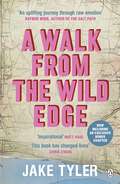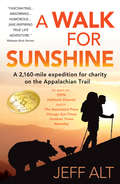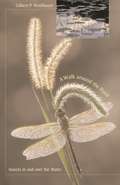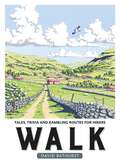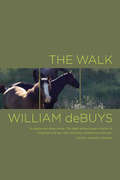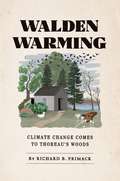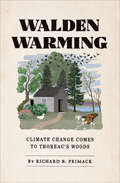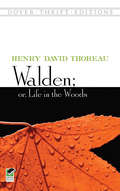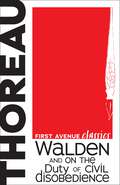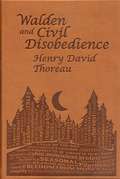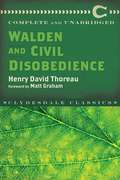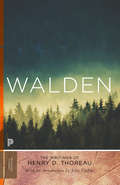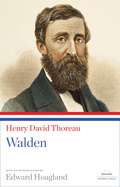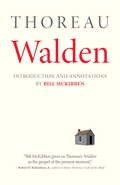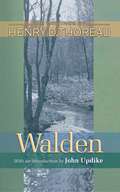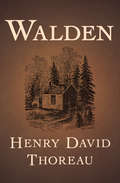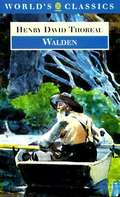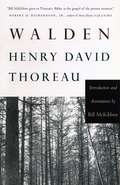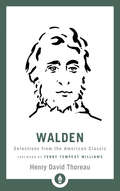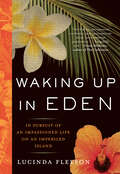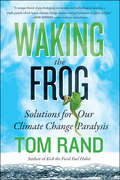- Table View
- List View
A Walk from the Wild Edge: ‘This Book Has Changed Lives’ Chris Evans
by Jake TylerThe remarkable true story of one man's inspiring journey through his 3,000 mile walk across the country'A great and inspirational read' MATT HAIG, bestselling author of Reasons to Stay Alive'Inspiring' INDEPENDENT'An uplifting and inspirational journey through raw emotion' RAYNOR WINN, bestselling author of The Salt PathAS SEEN ON BBC BREAKFAST______Jake Tyler had forgotten how to feel alive.With only a pair of boots and a backpack, he set off on a 3000-mile walk around Britain - along coastal paths, over mountains, through every national park.His journey became his road to recovery. On it he rediscovered the British landscape, the extraordinary kindness of strangers and most importantly, his place in the world.This is his inspiring story, away from the wild edge.______'Jake you have changed people's lives . . . we are all fans!' Chris Evans, Virgin Radio'An incredible journey, an inspirational memoir . . . beautiful' Zoe Ball, BBC Radio 2'Inspiring . . . It's something that will help many through these dark times' Bryony Gordon'This book is a tonic. Until we can all get out and explore Britain's beauty for ourselves again, this is the ideal substitute' Mirror'So compelling in his honesty . . . very poignant' Express'A tale told with courageous honesty. There's much to learn here about how reconnecting with nature and trusting others can rekindle the joy of being alive' BBC Countryfile 'A testament to the power of human connection, this is a physical and mental journey to inspire hope even in the darkest of times' National Geographic
A Walk for Sunshine: A 2,160 Mile Expedition for Charity on the Appalachian Trail
by Jeff AltJeff Alt takes you along every step of his 2,160-mile Appalachian Trail adventure filled with humorous, frightening, and inspirational stories including bears, bugs, blisters, captivating characters, skunk bed mates, and hilarious food cravings. As Alt walked more than 5 million steps through freezing temperatures, driving rain, and sunny skies, he was constantly buoyed by the knowledge that his walk was dedicated to his brother who has cerebral palsy. Alt's adventure inspired an annual fundraiser which has raised over $500,000 for Sunshine, the home where his brother lives. This is the 20th anniversary edition. As you walk along with Alt, experience the success of turning dreams into goals and achieving them. Alt's lessons from the trail celebrate family, stewardship of the earth, good health, and the American spirit. less
A Walk around the Pond: Insects in and over the Water
by Gilbert WaldbauerA water strider darts across a pond, its feet dimpling the surface tension; a giant water bug dives below, carrying his mate’s eggs on his back; hidden among plant roots on the silty bottom, a dragonfly larva stalks unwary minnows. Barely skimming the surface, in the air above the pond, swarm mayflies with diaphanous wings. Take this walk around the pond with Gilbert Waldbauer and discover the most amazingly diverse inhabitants of the freshwater world.In his hallmark companionable style, Waldbauer introduces us to the aquatic insects that have colonized ponds, lakes, streams, and rivers, especially those in North America. Along the way we learn about the diverse forms these arthropods take, as well as their remarkable modes of life—how they have radiated into every imaginable niche in the water environment, and how they cope with the challenges such an environment poses to respiration, vision, thermoregulation, and reproduction. We encounter the caddis fly larva building its protective case and camouflaging it with stream detritus; green darner dragonflies mating midair in an acrobatic wheel formation; ants that have adapted to the tiny water environment within a pitcher plant; and insects whose adaptations to the aquatic lifestyle are furnishing biomaterials engineers with ideas for future applications in industry and consumer goods.While learning about the evolution, natural history, and ecology of these insects, readers also discover more than a little about the scientists who study them.
Walk: Tales, Trivia and Rambling Routes for Hikers
by David BathurstWhether you prefer a leisurely ramble through woods, a meandering city stroll, a blustery seaside promenade or a vigorous mountain hike, you’ll be enthralled by the stories, excerpts of classic writing, trivia and practical tips in this book – perfect for anyone who loves the freedom of lacing up their hiking boots and heading for the hills.
Walk: Tales, Trivia and Rambling Routes for Hikers
by David BathurstWhether you prefer a leisurely ramble through woods, a meandering city stroll, a blustery seaside promenade or a vigorous mountain hike, you’ll be enthralled by the stories, excerpts of classic writing, trivia and practical tips in this book – perfect for anyone who loves the freedom of lacing up their hiking boots and heading for the hills.
The Walk
by William DebuysIn The Walk, William deBuys writes about personal loss and the power of the landscape to nurture the recovery of hope. The book consists of three interrelated essays that move from a period of strife in the author's life to a kind of limbo and eventually to a place of peace. The setting is deBuys' small farm in New Mexico's Sangre de Cristo Mountains. Each morning, he takes the same walk through the woods, arriving, as he describes in the first essay, at a clarity that comes from looking at the same vantage point for years. The middle essay, "Geranium," takes its name from a mare deBuys had to put down, and whose remains become one with the forest. In the final essay, deBuys reflects on drought, the loss of a friend, and the resurgence of land and hope. Contemplative, compassionate, and quietly humorous, The Walk is nature writing at its finest.
Walden's Shore
by Robert M. Thorson"Let us settle ourselves, and work and wedge our feet downward," Thoreau invites his readers in "Walden," "till we come to a hard bottom and rocks in place, which we can call "reality. "" "Waldens Shore" explores Thoreaus understanding of that hard reality, not as metaphor but as physical science. Robert M. Thorson is interested in Thoreau the rock and mineral collector, interpreter of landscapes, and field scientist whose compass and measuring stick were as important to him as his plant press. At "Walden"s climax, Thoreau asks us to imagine a "living earth" upon which all animal and plant life is parasitic. This book examines Thoreaus understanding of the geodynamics of that living earth, and how his understanding informed the writing of "Walden. " The story unfolds against the ferment of natural science in the nineteenth century, as Natural Theology gave way to modern secular science. That era saw one of the great blunders in the history of American science--the rejection of glacial theory. Thorson demonstrates just how close Thoreau came to discovering a "theory of everything" that could have explained most of the landscape he saw from the doorway of his cabin at Walden. At pivotal moments in his career, Thoreau encountered the work of the geologist Charles Lyell and that of his protege Charles Darwin. Thorson concludes that the inevitable path of Thoreaus thought was descendental, not transcendental, as he worked his way downward through the complexity of life to its inorganic origin, the living rock.
Walden Warming: Climate Change Comes to Thoreau's Woods
by Richard B. PrimackIn his meticulous notes on the natural history of Concord, Massachusetts, Henry David Thoreau records the first open flowers of highbush blueberry on May 11, 1853. If he were to look for the first blueberry flowers in Concord today, mid-May would be too late. In the 160 years since Thoreau’s writings, warming temperatures have pushed blueberry flowering three weeks earlier, and in 2012, following a winter and spring of record-breaking warmth, blueberries began flowering on April 1--six weeks earlier than in Thoreau’s time. The climate around Thoreau’s beloved Walden Pond is changing, with visible ecological consequences. In Walden Warming, Richard B. Primack uses Thoreau and Walden, icons of the conservation movement, to track the effects of a warming climate on Concord’s plants and animals. Under the attentive eyes of Primack, the notes that Thoreau made years ago are transformed from charming observations into scientific data sets. Primack finds that many wildflower species that Thoreau observed--including familiar groups such as irises, asters, and lilies--have declined in abundance or have disappeared from Concord. Primack also describes how warming temperatures have altered other aspects of Thoreau’s Concord, from the dates when ice departs from Walden Pond in late winter, to the arrival of birds in the spring, to the populations of fish, salamanders, and butterflies that live in the woodlands, river meadows, and ponds. Primack demonstrates that climate change is already here, and it is affecting not just Walden Pond but many other places in Concord and the surrounding region. Although we need to continue pressuring our political leaders to take action, Primack urges us each to heed the advice Thoreau offers in Walden: to "live simply and wisely. ” In the process, we can each minimize our own contributions to our warming climate.
Walden Warming: Climate Change Comes to Thoreau's Woods
by Richard B. PrimackIn his meticulous notes on the natural history of Concord, Massachusetts, Henry David Thoreau records the first open flowers of highbush blueberry on May 11, 1853. If he were to look for the first blueberry flowers in Concord today, mid-May would be too late. In the 160 years since Thoreau’s writings, warming temperatures have pushed blueberry flowering three weeks earlier, and in 2012, following a winter and spring of record-breaking warmth, blueberries began flowering on April 1—six weeks earlier than in Thoreau’s time. The climate around Thoreau’s beloved Walden Pond is changing, with visible ecological consequences. In Walden Warming, Richard B. Primack uses Thoreau and Walden, icons of the conservation movement, to track the effects of a warming climate on Concord’s plants and animals. Under the attentive eyes of Primack, the notes that Thoreau made years ago are transformed from charming observations into scientific data sets. Primack finds that many wildflower species that Thoreau observed—including familiar groups such as irises, asters, and lilies—have declined in abundance or have disappeared from Concord. Primack also describes how warming temperatures have altered other aspects of Thoreau’s Concord, from the dates when ice departs from Walden Pond in late winter, to the arrival of birds in the spring, to the populations of fish, salamanders, and butterflies that live in the woodlands, river meadows, and ponds. Primack demonstrates that climate change is already here, and it is affecting not just Walden Pond but many other places in Concord and the surrounding region. Although we need to continue pressuring our political leaders to take action, Primack urges us each to heed the advice Thoreau offers in Walden: to “live simply and wisely.” In the process, we can each minimize our own contributions to our warming climate.
Walden; Or, Life in the Woods
by Henry David ThoreauNature was a form of religion for naturalist, essayist, and early environmentalist Henry David Thoreau (1817–62). In communing with the natural world, he wished to "live deliberately, to front only the essential facts of life, and … learn what it had to teach." Toward that end Thoreau built a cabin in the spring of 1845 on the shores of Walden Pond — on land owned by Ralph Waldo Emerson — outside Concord, Massachusetts. There he observed nature, farmed, built fences, surveyed, and wrote in his journal.One product of his two-year sojourn was this book — a great classic of American letters. Interwoven with accounts of Thoreau's daily life (he received visitors and almost daily walked into Concord) are mediations on human existence, society, government, and other topics, expressed with wisdom and beauty of style.Walden offers abundant evidence of Thoreau's ability to begin with observations on a mundane incident or the minutiae of nature and then develop these observations into profound ruminations on the most fundamental human concerns. Credited with influencing Tolstoy, Gandhi, and other thinkers, the volume remains a masterpiece of philosophical reflection.A selection of the Common Core State Standards Initiative.
Walden, and On the Duty of Civil Disobedience (First Avenue Classics ™)
by Henry David ThoreauIn these two American literary classics, Henry David Thoreau offers readers his experiences and thoughts on how to live a more fulfilling life and stand up for what is right. Having spent two years living in solitude at Walden Pond, he stresses the importance of a quiet, reflective life and the rewards of a nonmaterialistic existence in Walden. His essay "On the Duty of Civil Disobedience" discusses his belief in nonviolent protests against an unjust government—in particular, he attacks the US government's approval of slavery and support for the Mexican-American War. These unabridged versions were first published in 1854 and 1849, respectively, but their ideas are timeless.
Walden and Civil Disobedience (Wordsworth Classics)
by Henry David ThoreauThe oft-quoted transcendentalist Henry David Thoreau is best known for two works: Walden and Civil Disobedience. Walden, first published in 1854, documents the time Thoreau spent living with nature in a hand-built cabin in the woods near Walden Pond in Massachusetts. A minor work in its own time, Walden burgeoned in popularity during the counter culture movement of the 1960s. Civil Disobedience is thought to have originated after Thoreau spent a night in jail for refusing to pay taxes to a government with whose policies he did not agree. Assigning greater importance to the conscience of the individual than the governing law, Civil Disobedience is an internationally admired work that is known to have influenced writer Leo Tolstoy and political activist Mahatma Gandhi, and many members of the American Civil Rights Movement. Now available together in one chic and affordable edition as part of the Word Cloud Classics series, Walden and Civil Disobedience makes an attractive addition to any library
Walden and Civil Disobedience (First Avenue Classics Ser.)
by Henry David Thoreau Matt GrahamPackaged in handsome, affordable trade editions, Clydesdale Classics is a new series of essential works. From the musings of academics such as Thomas Paine in Common Sense to the striking personal narrative of Harriet Jacobs in Incidents in the Life of a Slave Girl, this new series is a comprehensive collection of our intellectual history through the words of the exceptional few.First published in 1854, Walden was written by the renowned transcendentalist Henry David Thoreau about his experience living off the land at Walden Pond for more than two years. Thoreau divides his deliberations and meditations into a variety of sections which include his views on economy and the natural world, the importance of reading and literature, the values of both solitude and companionship, and other personal reflections. In addition to Walden, this edition also includes Thoreau’s essay on Civil Disobedience, which discusses his views on the nature of government and its negative effects on society.With a new foreword by survivalist Matt Graham, venture into the woods with Thoreau and explore the complexities of life and truth in this classic piece of American literature.
Walden
by Henry D. ThoreauOne of the most influential and compelling books in American literature, Walden is a vivid account of the years that Henry D. Thoreau spent alone in a secluded cabin at Walden Pond. This edition--introduced by noted American writer John Updike--celebrates the perennial importance of a classic work, originally published in 1854. Much of Walden's material is derived from Thoreau's journals and contains such engaging pieces from the lively "Where I Lived, and What I Lived For" and "Brute Neighbors" to the serene "Reading" and "The Pond in the Winter." Other famous sections involve Thoreau's visits with a Canadian woodcutter and with an Irish family, a trip to Concord, and a description of his bean field. This is the complete and authoritative text of Walden--as close to Thoreau's original intention as all available evidence allows. This is the authoritative text of Walden and the ideal presentation of Thoreau's great document of social criticism and dissent.
Walden
by Henry David ThoreauIn 1845 Henry David Thoreau left his pencil-manufacturing business and began building a cabin on the shore of Walden Pond near Concord, Massachusetts. This lyrical yet practical-minded book is at once a record of the 26 months Thoreau spent in withdrawal from society -- an account of the daily minutiae of building, planting, hunting, cooking, and, always, observing nature -- and a declaration of independence from the oppressive mores of the world he left behind. Elegant, witty, and quietly searching, Walden remains the most persuasive American argument for simplicity of life clarity of conscience. For the first time, the authoritative editions of works by major American novelists, poets, scholars, and essayists collected in the hardcover volumes of The Library of America are being published singly in a series of handsome paperback books. A distinguished writer has contributed an introduction for each volume, which also includes a chronology of the author's life and career, an essay on the text, and notes. From the Trade Paperback edition.
Walden: Oder Leben In Der Waldern (Concord Library)
by Henry David ThoreauFirst published in 1854, Henry David Thoreau's groundbreaking book has influenced generations of readers and continues to inspire and inform anyone with an open mind and a love of nature. With Bill McKibben providing a newly revised Introduction and helpful annotations that place Thoreau firmly in his role as cultural and spiritual seer, this beautiful edition of Walden for the new millennium is more accessible and relevant than ever.
Walden
by Henry David Thoreau<P>To celebrate the 150th anniversary of the original publication of Thoreau's classic work (which is cited in Books for College Libraries, 3rd ed.), this special edition is published in cooperation with the Walden Woods Project, a nonprofit organization founded in 1990 to preserve the land, literature, and legacy of Thoreau. The text includes a brief introduction by E. O. Wilson. <P>[This text is listed as an example that meets Common Core Standards in English language arts in grades 11-12 at http://www.corestandards.org.]
Walden: Large Print
by Henry David Thoreau<P>An American masterwork in praise of nature, self-reliance, and the simple lifeI went to the woods because I wished to live deliberately, to front only the essential facts of life, and see if I could not learn what it had to teach, and not, when I came to die, discover that I had not lived. <P>In 1845, the transcendentalist Henry David Thoreau moved from his home in the town of Concord, Massachusetts, to a small cabin he built by hand on the shores of Walden Pond. <P>He spent the next two years alone in the woods, learning to live self-sufficiently and to take his creative and moral inspiration from nature. P <P>art memoir, part philosophical treatise, part environmental manifesto, Walden is Thoreau's inspirational account of those extraordinary years and one of the most influential books ever written.
Walden
by Henry David Thoreau Stephen FenderIn 1845 Henry David Thoreau began a new life, spending most of each week for over two years in a rough hut he built himself on the northwest shore of Walden Pond, just a mile and a half from his home town of Concord, Massachusetts. Walden is Thoreau's autobiographical account of this experiment in solitary living, his refusal to play by the rules of hard work and the accumulation of wealth and, above all, the freedom it gave him to adapt his living to the natural world around him. This new edition traces the sources of Thoreau's reading and thinking and considers the author in the context of his birthplace and his sense of its history - social, economic, and natural. In addition, an ecological appendix provides modern identifications of the myriad plants and animals to which Thoreau gave increasingly close attention as he became acclimatized to his life at Walden. Long-revered by political reformers and environmentalists, Walden is here reassessed by Stephen Fender, whose edition is based on research into the material conditions of Thoreau's life in Concord, and the town's place in the history of mid-nineteenth-century New England. [This text is listed as an example that meets Common Core Standards in English language arts in grades 11-12 at http://www.corestandards.org.]
Walden: Introduction and Annotations by Bill McKibben (Concord Library)
by Henry David Thoreau Bill MckibbenFirst published in 1854, Henry David Thoreau's groundbreaking book has influenced generations of readers and continues to inspire and inform anyone with an open mind and a love of nature. With Bill McKibben providing a newly revised Introduction and helpful annotations that place Thoreau firmly in his role as cultural and spiritual seer, this beautiful edition of Walden for the new millennium is more accessible and relevant than ever. [This text is listed as an example that meets Common Core Standards in English language arts in grades 11-12 at http://www.corestandards.org.]
Walden: Selections from the American Classic (Shambhala Library)
by Henry David Thoreau Terry Tempest WilliamsSelections from one of the great classics of literature--now part of the Shambhala Pocket Library.In July 1845, Henry David Thoreau built a small cottage in the woods near Walden Pond in Concord, Massachusetts, and began to write Walden, a chronicle of his communion with nature. Since its first publication in 1854, the work has become a classic, beloved for its message of living simply and in harmony with nature. This abridged edition of Walden features exquisite wood engravings by Michael McCurdy and a foreword by noted author and environmentalist Terry Tempest Williams, who reflects upon Thoreau’s message that as we explore our world and ourselves, we draw closer to the truth of our connectedness.This book is part of the Shambhala Pocket Library series.The Shambhala Pocket Library is a collection of short, portable teachings from notable figures across religious traditions and classic texts. The covers in this series are rendered by Colorado artist Robert Spellman. The books in this collection distill the wisdom and heart of the work Shambhala Publications has published over 50 years into a compact format that is collectible, reader-friendly, and applicable to everyday life.
Wald in der Vielfalt möglicher Perspektiven: Von der Pluralität lebensweltlicher Bezüge und wissenschaftlicher Thematisierungen (RaumFragen: Stadt – Region – Landschaft)
by Karsten Berr Corinna JenalAn Wälder herangetragene Funktionen werden in einer sich weiter ausdifferenzierenden Gesellschaft immer komplexer und führen in der Folge häufig auch zu zunehmend dichotomisierenden und gewaltsamen Konflikten um Wald bzw. waldbezogene Maßnahmen. Beispielsweise sind die physischen Grundlagen zentraler Bestandteil bei der Deckung bestehender Bedarfe nachwachsender Rohstoffe sowie Arbeitsplatz und Existenzgrundlage für mehr als eine Million Menschen im Cluster Forst und Holz in Deutschland. Ökologisch sind sie von zentraler Bedeutung als CO2- und Wasserspeicher, das Ökosystem Wald ist bedeutender Klimafaktor, sozial als Topos der Naherholung, symbolischer Einschreibungen, therapeutischer Maßnahmen, Kulisse für Fitness oder Freizeit und vieles mehr.Bestehende waldbezogene Literatur fokussiert – häufig dem Umstand der Spezialisierung geschuldet – vielfach jeweils nur einen der genannten Bereiche und Aspekte, in deren Kontext weitere ergänzende Aspekte zu Wald in den Hintergrund rücken. Der vorliegende Band versteht sich als Versuch, diese Fokussierungen zu überwinden und multiperspektivische Sichtweisen zu Wald zusammenzutragen, um auf die Vielfalt der möglichen Perspektiven und thematischen Aspekte zu Wald zu verweisen und einer Verhärtung von Fronten entgegenzuwirken.
Waking Up in Eden: In Pursuit of an Impassioned Life on an Imperiled Island
by Lucinda FleesonA woman journeys to Kauai to save Hawaii’s native plants: “Part history, part personal confession, part cautionary tale about environmental preservation” (Gioia Diliberto, author of Paris Without End). One day, Lucinda Fleeson quit her big-city newspaper job, sold her suburban house, and moved halfway across the world to the island of Kauai to work at the National Tropical Botanical Garden. Imagine a hundred-acre garden estate nestled amid ocean cliffs, rain forests, and secluded coves. Exotic and beautiful, yes, but as Fleeson awakens to this sensual world, exploring the island’s food, beaches, and history, she encounters an endangered paradise—the Hawaii we don’t see in the tourist brochures. Native plants are dying at an astonishing rate—Hawaii is called the Extinction Capital of the World—and invasive species (plants, animals, and humans) have imperiled this Garden of Eden. Fleeson accompanies a plant hunter into the rain forest to find the last of a dying species, descends into limestone caves with a paleontologist who deconstructs island history through fossil life, and shadows a botanical pioneer who propagates rare seeds, hoping to reclaim the landscape. Her grown-up adventure is a reminder of the value of choosing passion over security, individuality over convention, and the pressing need to protect the earth. And as she witnesses the island’s plant renewal efforts, she sees her own life blossom again. “[An] impeccably researched, beautifully told tale of how America’s most exotic locale transformed the life of an urban journalist.” —Gioia Diliberto “As she delves deep into the island’s history and ventures far into its delicate ecosystem, Fleeson undertakes her own personal and professional salvation, a spirited and daring pilgrimage that is both revelatory and enlightening.” —Booklist
Waking the Frog: Solutions for Our Climate Change Paralysis
by Tom Rand<p>A venture capitalist, entrepreneur, and engineer, Tom Rand looks to contemporary psychology, economics, business, and finance to explain our difficulty in confronting one of the most fundamental problems of our time. Rand’s account doesn’t just point fingers at the bad guys, but goes deeper—to our motivations, institutional lethargy, and deeply buried assumptions about market economics. <p>Waking the Frog reveals that our ingenuity, technology, capital, and policy can work together to turn down the heat—and at the same time enable the largest economic opportunity of the twenty-first century. </p>
